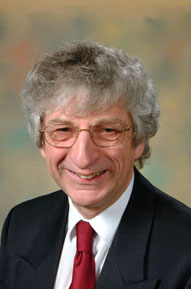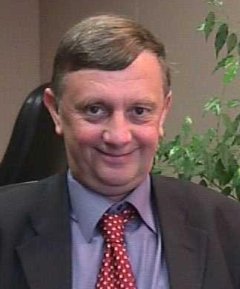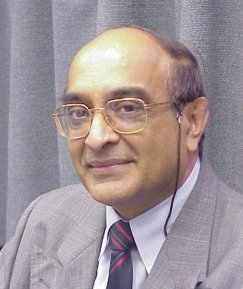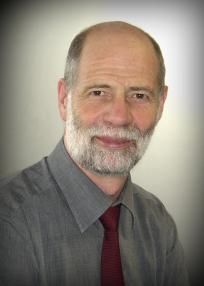 Josep Blat is professor of Computer Science at
Universitat Pompeu Fabra (Barcelona) since 1998 where he is currently
director of the Institut Universitari de
l'Audiovisual, after being head of the Departament de
Tecnologia and of the Escola Superior
Politècnica. He was previously at Universitat
de les Illes Balears where he was head of its Dpt of Maths
& Computer Science from 1988 till 1994. He graduated from Universitat de València in 1979, got his Ph D
(Mathematics) at Heriot-Watt University (Edinburgh) in 1985 and has
developed post-doctoral work at Université
Paris-Dauphine where he has been visiting professor.
Josep Blat is professor of Computer Science at
Universitat Pompeu Fabra (Barcelona) since 1998 where he is currently
director of the Institut Universitari de
l'Audiovisual, after being head of the Departament de
Tecnologia and of the Escola Superior
Politècnica. He was previously at Universitat
de les Illes Balears where he was head of its Dpt of Maths
& Computer Science from 1988 till 1994. He graduated from Universitat de València in 1979, got his Ph D
(Mathematics) at Heriot-Watt University (Edinburgh) in 1985 and has
developed post-doctoral work at Université
Paris-Dauphine where he has been visiting professor.
After his initial research work in Applied Nonlinear Analysis, he passed to modelling and mathematical analysis of images (collective prize Philip Morris France 1991). His current research interests include cooperative environments; intelligent web portals; educational telematics; multimedia and GIS; computational educational toys; advanced 3D graphics (human modelling and animation) , interactive games, digital cinema, ICT acessibility, human computer interaction, ambient intelligence, residential gateways.
He has developed research and development in the frame of the European programes. Currenty, his projects include TenCompetence (Technology Enhanced Learning), ICING (e-Government), SALERO and IP-RACINE (cross-media), OpenDock (Leonardo) and Bazaar (eLearning). Recently, he took part in FP5: Link3D, CHIPS network, and SpeedFX within IST; SCOPE and eTITLE (eContent), SIGOSSEE (eLearning) and has coordinated the FP6 coordination action UNFOLD. In the past, in the programmes HCM (MMIP), ESPRIT (CHARM, NEMESIS, éTui), RACE (MONALISA), TMR (PAVR), TAP (KAMP, MINTour, MAID, EuroIEMaster), BIOMED (MIAS). He has also taken part in several IMPACT, COMETT, Media Investment Club, TEMPUS, DGXXIII supported programmes.
He has coordinated an important production of Computer Animation and Interactive Multimedia materials, with partial Spanish and European funding and has been director of two widely awarded European Masters at UIB, ISCA and IMM. He is currently co-director of two IDEC-UPF also awarded masters, in Computer Animation, and Videogames Design and Programming. He has been member of the Information Engineering research panel, of the Committee for the Applications of Mathematics of the European Mathematical Society, and in 1991-92 he was member of the Board of Administrators of CITE-UETP.
 Peter Brown is founder of Pensive.eu, a
consultancy, research and software development company based in
Vienna, Austria. He is currently Chair of the CEN eGovernment Focus
Group and until July 2006 was Senior Expert on eGovernment strategy in
the Austrian Federal Chancellery where he promoted work on
pan-European eGovernment services, electronic identity management and
EU “Information Society” policies.
Peter Brown is founder of Pensive.eu, a
consultancy, research and software development company based in
Vienna, Austria. He is currently Chair of the CEN eGovernment Focus
Group and until July 2006 was Senior Expert on eGovernment strategy in
the Austrian Federal Chancellery where he promoted work on
pan-European eGovernment services, electronic identity management and
EU “Information Society” policies.
From 2000 to 2004, Peter led data standardisation and interoperability efforts in the European Parliament and introduced the EU institutions to XML standards, business-centred information modelling, information architecture, and most recently to Topic Maps. He is the author of “Information Architecture with XML – a Management Strategy” (John Wiley and Sons, 2003), works regularly in many European languages, lectures extensively in Europe and North America and has worked as an expert for projects in Africa and Latin America.
 Antonio Conte graduated in Electronic Engineering
from the University “La Sapienza” in Rome (1984).
Antonio Conte graduated in Electronic Engineering
from the University “La Sapienza” in Rome (1984).
After serving in the Italian Navy to accomplish his compulsory military service, he worked in ITALCABLE HQ in Rome from 1986 to 1990 as a system engineer in charge of the development of packet-switched data network (PSDN) projects.
He joined DG XIII (now Information Society & Media) of the European Commission in 1990 as project officer in the Conformance Testing Services (CTS) programme, which aimed at providing harmonised tools and facilities throughout Europe to meet the market requirements for testing services.
Subsequently, in DG III he was involved in the management of the Information Society Initiatives for Standardisation (ISIS), supporting work of an application, validation, or demonstration nature focused on standards underpinning Information Society related domains of high economic and social impact.
Moving to DG Enterprise & Industry in 1999, he was in charge of the management of sectoral consensus-building initiatives and, successively, of the development of standardisation policy and activities in support of the e-Europe Action Plans. He currently advises on ICT standardisation policy matters with a particular focus on e-business, e-government and security issues.
 Andrew Houghton is Principal Scientific Officer in
the Directorate-General Information Society and Media (DG INFSO) of
the European Commission, in Brussels, Belgium. He received a B.Sc.
degree from the University of Sussex, UK, and a Ph.D. from the
University of Nottingham, UK. After five years with BT Research
Labs, he joined STC /Northern Telecom Optoelectronics, where he was
involved in engineering and production of devices for optical
communications systems. In 1992 he joined the European Commission, as
a Project Officer. He is currently responsible for projects in the
Unit D1 “Future Networks,” which is responsible for the
Strategic Objectives “Broadband For All” and “Mobile
and Wireless Beyond 3G” of the Information Society Technologies
(IST) FP6 Research Programme.
Andrew Houghton is Principal Scientific Officer in
the Directorate-General Information Society and Media (DG INFSO) of
the European Commission, in Brussels, Belgium. He received a B.Sc.
degree from the University of Sussex, UK, and a Ph.D. from the
University of Nottingham, UK. After five years with BT Research
Labs, he joined STC /Northern Telecom Optoelectronics, where he was
involved in engineering and production of devices for optical
communications systems. In 1992 he joined the European Commission, as
a Project Officer. He is currently responsible for projects in the
Unit D1 “Future Networks,” which is responsible for the
Strategic Objectives “Broadband For All” and “Mobile
and Wireless Beyond 3G” of the Information Society Technologies
(IST) FP6 Research Programme.
 Keith Jeffery is currently Director IT and
International Strategy of CCLRC (Council for the Central Laboratory of
the Research Councils), based at Rutherford Appleton Laboratory in UK.
Previously he was Director IT and Head of Business and Information
Technology Department (15m€ p.a. turnover, 140 staff) providing
services to CLRC, national services to the UK academic community and
undertaking research and development projects funded by the UK
Research Councils, government departments, the European Commission and
commerce and industry internationally.
Keith Jeffery is currently Director IT and
International Strategy of CCLRC (Council for the Central Laboratory of
the Research Councils), based at Rutherford Appleton Laboratory in UK.
Previously he was Director IT and Head of Business and Information
Technology Department (15m€ p.a. turnover, 140 staff) providing
services to CLRC, national services to the UK academic community and
undertaking research and development projects funded by the UK
Research Councils, government departments, the European Commission and
commerce and industry internationally.
Keith has extensive experience in consultancy, project management and product development both within the public sector and the commercial sector. He has been involved actively in EC-funded projects as reviewer, coordinator, system architect and in technical and exploitation roles. He was editor-in-chief and later chairman for the Next Generation GRIDs expert group of DG INFSO F2.
Previous positions included running a Division for Information Systems Engineering, leading a database and office systems service group, running a group using computing for environmental science data storage, retrieval, analysis and modelling, and leading a team providing a computing service to the UK Geological Survey.
Keith holds a BSc in Geology, a PhD in Geology (with a very large computing content!) and is a Fellow of both the Geological Society of London and the British Computer Society. He is a Chartered Engineer and Chartered IT Professional. He is an Honorary Fellow of the Irish Computer Society. He is a trustee emeritus (past secretary and vice-president) of the Endowment Board of the VLDB (Very Large Database) Conference, and is a member of the boards controlling the EDBT (Extending Database Technology) conference, CAiSE (Conference on Advanced Systems Engineering) and OOIS (Object-Oriented Information Systems) conference. He is a member of the SOFSEM Steering Committee. He is president of euroCRIS and president of ERCIM. He serves on several programme committees for international and national conferences, he reviews material for journals and books and reviews research proposals for several countries. He has numerous publications in refereed journals, books and conference proceedings. He holds the positions of Honorary Professor of Computer Science at Heriot-Watt University, Honorary Professor of Computer Science at Cardiff University, Honorary Visiting Professor at the Faculty of Informatics, Masaryk University, Brno, Czech Republic and Senior Visiting Fellow in Computer Science at the University of Birmingham.
 John Ketchell is the CEN Director of Pre-Standards,
which includes in particular the Workshop and Focus Group operations
of CEN's Information Society Standardization System (ISSS). This was
created on 1 July 1997 as a focal point for standards-related
activities in this area. Previously, he was responsible for external
coordination activities within the European Telecommunications
Standards Institute (ETSI), where he was also responsible for the
secretariat of a High-Level Task Force and subsequent arrangements
concerning the reorganization of the Institute's activities. He was
the Secretary to the European Information and Communication
Technologies (ICT) Standards Board (ICTSB) from its inception.
John Ketchell is the CEN Director of Pre-Standards,
which includes in particular the Workshop and Focus Group operations
of CEN's Information Society Standardization System (ISSS). This was
created on 1 July 1997 as a focal point for standards-related
activities in this area. Previously, he was responsible for external
coordination activities within the European Telecommunications
Standards Institute (ETSI), where he was also responsible for the
secretariat of a High-Level Task Force and subsequent arrangements
concerning the reorganization of the Institute's activities. He was
the Secretary to the European Information and Communication
Technologies (ICT) Standards Board (ICTSB) from its inception.
An economist and linguist, John's previous career was in the United Kingdom public administration, with a marked bias towards European Union matters, including the regulatory and standards aspects of radiocommunications.
He currently chairs the COPRAS Steering Group of the five partner organizations, which manages this project.
 With WSIS agreement and the
urgent need to address digital divide worldwide, together with the
accelerated pace of convergence between telecommunications,
information technology, broadcasting and entertainment driving the
whole added-value chain, ICTSB has a significant role to play to
ensure that there is no duplication of efforts between formally
recognised ESOs on one hand and the industry driven fora / standards
bodies. Open (and not proprietary) standards / specifications are
needed more than ever to remove market uncertainties and create a
large global market base so as to reduce costs.
With WSIS agreement and the
urgent need to address digital divide worldwide, together with the
accelerated pace of convergence between telecommunications,
information technology, broadcasting and entertainment driving the
whole added-value chain, ICTSB has a significant role to play to
ensure that there is no duplication of efforts between formally
recognised ESOs on one hand and the industry driven fora / standards
bodies. Open (and not proprietary) standards / specifications are
needed more than ever to remove market uncertainties and create a
large global market base so as to reduce costs.
Mr. Lathia is Chairman of ICTSB and has more than thirty years of management experience within telecommunications industry and has worked within all stages of life cycle from customer requirements and conceptual design through to field installation and hand-over of telecommunications systems to customers.
At ETSI, he has been member of the ETSI Board and has held chairmanship of various strategic committees, including the Finance Committee, and has been a key player in establishing 3GPP.
Within ITU, he is Vice Chairman of “Study Group 19 - Mobile Telecommunication Networks and mobility” (i.e., 3G and beyond plus FMC). He has also organised and/or chaired ITU seminars on IMT-2000 in Australia, Brazil, Canada, Côte d'Ivoire, Kenya, Slovenia, etc.
Graduated in Electrical Engineering with Magna cum Laude, he is a Chartered Engineer and Fellow of the Institution of Engineering and Technology.
 Prof. Dr. Michael Lawo is with TZI at the
Universität Bremen since 2004 as the Technical Manager of the EC IP
2004-004216 wearIT@work. At the Universities of Bochum and Essen he
studied structural engineering and specialized in applied computer
sciences. His scientific career continued in robotics at the Nuclear
Research Centre Karlsruhe. Later he was 15 years in management, IT
management, and consulting positions in industry. He is author,
co-author and co-publisher of six books and more than 120 papers on
numerical methods and computer applications, optimization, robotics,
virtual reality, IT-security, and wearable computing.
Prof. Dr. Michael Lawo is with TZI at the
Universität Bremen since 2004 as the Technical Manager of the EC IP
2004-004216 wearIT@work. At the Universities of Bochum and Essen he
studied structural engineering and specialized in applied computer
sciences. His scientific career continued in robotics at the Nuclear
Research Centre Karlsruhe. Later he was 15 years in management, IT
management, and consulting positions in industry. He is author,
co-author and co-publisher of six books and more than 120 papers on
numerical methods and computer applications, optimization, robotics,
virtual reality, IT-security, and wearable computing.
 Drs. Manon van Leeuwen obtained her University
Degree in Business Economics at the University of Tilburg (The
Netherlands), specialising in organisational processes (focus on
culture, structure and internal communication). She obtained a Master
of the University Pontificia Commillas, ICADE Madrid, and is realising
her Ph.D. in “New tendencies in Company Management” of the
University of Valladolid (Spain).
Drs. Manon van Leeuwen obtained her University
Degree in Business Economics at the University of Tilburg (The
Netherlands), specialising in organisational processes (focus on
culture, structure and internal communication). She obtained a Master
of the University Pontificia Commillas, ICADE Madrid, and is realising
her Ph.D. in “New tendencies in Company Management” of the
University of Valladolid (Spain).
She is currently Director of Information Society at Fundecyt and formerly has been Director of the Department for European Programmes of the Foundation University-Enterprise of Valladolid. As an expert on issues related to the Information Society, Knowledge Society and Knowledge Management she has been a professor and speaker on courses and seminars. She has participated in the International Project Team for the European Committee for Standardisation to identify and disseminate best practices and measurement approaches for KM, and deliver a European Guide to Good Practice in Knowledge Management. She has been evaluator and reviewer in various occasions of the IST and FP 5 and 6 programme.
She has a large experience in the preparation, realisation and execution of regional, national and international projects, the projects are related to the new economy and the knowledge society, and are of technological and social nature, many of them addressing the needs of eInclusion of high risk groups. Including a large experience in managing multidisciplinary and intercultural projects, as well as European Community programmes.
 Dr. Alexander Roth holds a master degree in general
physics from the Technical University of Munich and a PhD in the field
of Biophysics. Previous to joining Siemens AG he has worked as a
research fellow at the University of California Los Angeles in the
field of soft condensed matter and at Technical University of Munich
on polymeric materials.
Dr. Alexander Roth holds a master degree in general
physics from the Technical University of Munich and a PhD in the field
of Biophysics. Previous to joining Siemens AG he has worked as a
research fellow at the University of California Los Angeles in the
field of soft condensed matter and at Technical University of Munich
on polymeric materials.
Since April 2005 within Siemens AG, Dr. Alexander Roth is responsible for the market access through standardization and regulation of emerging technologies.
He is chairman of the standardization & regulation working group in ARTEMIS, an ETP for embedded systems, chairman of EICTA's RFID issue group, delegate at ISO TC 229 for nanotechnologies and involved in ultra wide band frequency allocation at CEPT and in several RFID standardization projects.
 Dr. Walter Weigel graduated from the Technical
University in Munich, Germany, with a Master Degree in electrical
engineering in 1984 and with a Ph. D. degree in 1990. From 1984 to
1991 he was assistant professor at the Institute of Data Processing at
the Technical University in Munich, where he managed a European
ESPRIT research-project with the University of Nancy, France, on
speech recognition.
Dr. Walter Weigel graduated from the Technical
University in Munich, Germany, with a Master Degree in electrical
engineering in 1984 and with a Ph. D. degree in 1990. From 1984 to
1991 he was assistant professor at the Institute of Data Processing at
the Technical University in Munich, where he managed a European
ESPRIT research-project with the University of Nancy, France, on
speech recognition.
Dr. Walter Weigel was until August 2006 the Head of “Standardization & Regulation” of Siemens AG, Munich, Germany, and worked for Siemens since 1991 in several positions including Head of the Research & Concepts-department of the Mobile Networks business unit as well as for the semiconductor business unit (today Infineon) as Head of the business segment Video Processing.
He initiated and founded the industry consortium on CPRI (Common Public Radio Interface) together with Ericsson, NEC, Nortel and Huawei. He was involved in the set-up of several EU FP-projects such as WINNER and German BMBF-projects such as WIGWAM. He has published about 50 technical papers and contributed to several books. He is member of the DKE steering committee LA, the DIN Fokus-ICT, and the Cenelec Global Forum. Dr. Weigel has been elected as the new General Director of ETSI and has this responsibility since September 2006.
 Peter Zangl has been associated with the European
Commission since 1978 in various functions. Since 2001, he is Deputy
Director General of DG INFSO, in which function he was, among other
things, responsible for the Eurostat Task Force (2003). Before that,
he was Director for Southern Mediterranean, Near and Middle East, and
Director for European Social Fund and for Resources Management. An
economist by training, he has also worked at the Directorate General
for Budgetary Affairs and the Directorate General for Economic and
Monetary Affairs. Before joining the EC, Peter Zangl studied Economics
in France (University of Rouen) and in Germany (University of
Cologne), where he also graduated, and held a post as research
assistant at the Rheinisch-Westfälisches Institut für
Wirtschafts-forschung in Essen (Germany).
Peter Zangl has been associated with the European
Commission since 1978 in various functions. Since 2001, he is Deputy
Director General of DG INFSO, in which function he was, among other
things, responsible for the Eurostat Task Force (2003). Before that,
he was Director for Southern Mediterranean, Near and Middle East, and
Director for European Social Fund and for Resources Management. An
economist by training, he has also worked at the Directorate General
for Budgetary Affairs and the Directorate General for Economic and
Monetary Affairs. Before joining the EC, Peter Zangl studied Economics
in France (University of Rouen) and in Germany (University of
Cologne), where he also graduated, and held a post as research
assistant at the Rheinisch-Westfälisches Institut für
Wirtschafts-forschung in Essen (Germany).